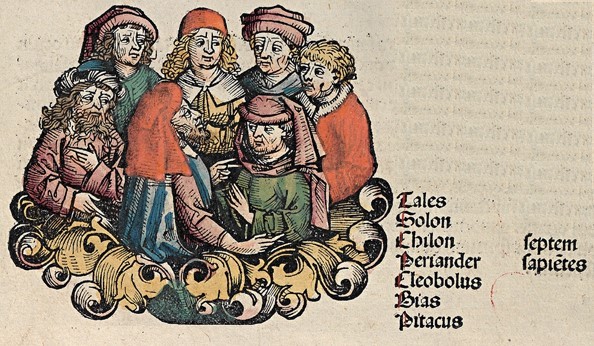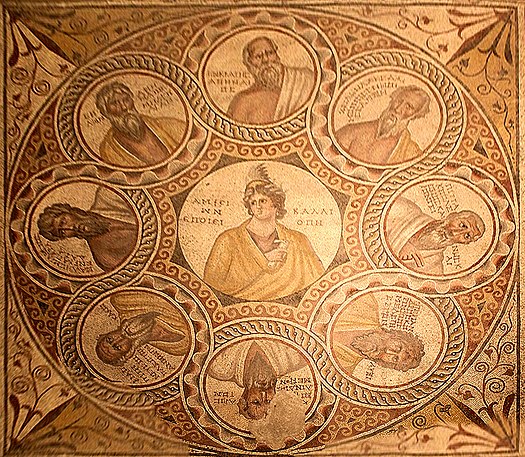by Ed Whelan, Contributing Writer, Classical Wisdom
The seven sages of Ancient Greece were seven wise men who lived in the Archaic Period (6-7th century BC). They were thinkers, rulers and statesmen. Their wisdom was revered in the ancient world, offered practical advice, and also influenced the development of the Golden Age of the Classical World. They were pioneers of Ancient Greek philosophy and politics, which still influences us to this day. Little is known about these figures or their thought and many appear to be semi-mythical.
The origin of the Seven Sages
The idea of extremely wise men possibly originated in Ancient Mesopotamia. The list of seven sages was drawn up by ancient writers including Herodotus, the ‘Father of History’. There was disagreement among the writers as to who should be included in the list. In total, about 23 men have been included in different versions of the list of the seven sages. The list of seven sages discussed below is the canonical list.
The Seven Wisest Men in Greece
Bias of Priene (6th century BC) Bias was a famous politician and lawyer. He renowned as an advocate and famous for his kindness and ransomed women who had been kidnapped. Despite this he believed that “Most men are bad.” Little else is know about him.
Cleobulus of Lindos (lived 600 BC). Cleobulus was a poet who was famous for his riddles in verse and is believed to have studied in Egypt. He became the tyrant of the Rhodian city of Lindos, which he ruled for 40 years, and was the father of Cleobulina, a famous poetess. His best-known aphorism ‘moderation is the chief good’.
Solon of Athens (c 638-558 BC). Solon was an Athenian who was a great political and legal reformer. He rolled back the savage laws of Draco and attempted to ban debt slavery. After his reforms he travelled widely. Solon is often regarded as one of the founders of Athenian democracy. Among his best-known sayings are ‘nothing in excess’ and ‘count no man happy until he is dead’.
Chilon of Sparta (c 500 BC). Chilon was a Spartan statesman who was instrumental in the militarization of Sparta and the development of its famous warriors. He is reputed to have died of joy when he heard that his son was victorious at the Olympics. His motto was ‘”You should not desire the impossible.”
Thales of Miletus – (c. 624 BC – c. 546 BC). Thales lived in Ionia and is one of the first known scientists and philosophers. He is regarded as the founder of the Ionian School of philosophers. Thales sought to explain the world using experiment and observation rather than myth. He predicted an eclipse in 585 BC. His best know-saying was inscribed on the exterior of the Oracle of Apollo in Delphi was that ‘surety brings disaster’.
Pittacus of Mytilene (c. 640–568 BC), was the ruler of Mytilene on the island of Lesbos. He was a famous general and once saved his city from an Athenian invasion. He was a democrat and favored the poorer classes. His saying it is ‘hard to be a good man’ was popular in the Classical World and was discussed by Plato in the Protagoras, one of his dialogues. Another popular saying attributed to Pittacus was that, “You should know which opportunities to choose.”
Periander of Corinth (fl. 627 BC). Periander was a member of the Cypselid Dynasty and the rule of the city of Corinth. He was a capable administrator and established several colonies and under his rule, the city enjoyed a Golden Age. In some sources he is shown to have been a cruel ruler. His most famous saying is, “Forethought in all things.”
Other Seven Wise Men
The following are often included in some lists of the wise men.
Myson of Chenae (6th-century BC). Myson was the son of a powerful tyrant. He seems to have withdrawn from public life and became a simple farmer. The Oracle at Delphi once called him the wisest man in Greece. Myson argued that facts should be used to settle any arguments.
Anacharsis (6th century BC) was a Scythian from what is now Ukraine. He travelled to Athens, and he dazzled the Athenians with his philosophy. Many believe that he influenced the development of the Cynic school of philosophy. Herodotus claims that when Anacharsis returned to Scythia he was killed for his attempts to popularize Greek customs by his own brother.
Several other eminent men were also regarded as sages by Hellenistic writers (4th century BC to 1st century BC). Among these were Lasus and Aristoxenus, about whom we know nothing.
Conclusions
The seven sages or wise men are often seen as transitional figures. When the myths no longer were convincing, the sages replaced figures such as Odysseus as figures who offered practical wisdom. These sages and their sayings embodied popular Greek social norms and cultural values. To say that the paved the way for a more empirical and rational worldview may be an exaggeration but the esteem in which they were held indicates the growing respect for reason in Ancient Greece.
References
Diogenes Laertius (1925). Lives of the Eminent philosophers. London: Loeb Classical Library.













No comments yet. You should be kind and add one!
Our apologies, you must be logged in to post a comment.